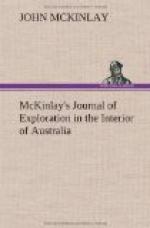Friday, November 1.
Wind westerly and strong and lots of light fleecy clouds. About 9 a.m. the native Bullingani, who was out with me, came into camp alone, having disappeared the evening of my return from Kadhibaerri. I wish he understood a little English as then he would be of much service.
Saturday, November 2.
Wind westerly round to south and east during the day, afternoon very strong westerly. Rode out today to the highest sandhill south-east and round to west and north-west of the lake I am now on to see if any likelihood of water to the east, west, or north-west; found a good deal in a creek running northerly on west side of lake and beyond it; returned by west side of lake. The native went away this afternoon, promising to be back tomorrow.
Sunday, November 3.
Very strong west wind but cool and agreeable. Native not returned.
Monday, November 4.
In the morning wind light from south, veered round to east; blew strong but cool. From the termination of the trees on creek that fills this lake Anlaby Hill bears 165 degrees; patiently awaiting a good shower to enable me to get to Cooper’s Creek Depot to ascertain if any further traces of Burke’s party or his camels are there visible, or if Mr. Howitt’s party have arrived. On my way out on Saturday about two miles from here found dung of horses or mules, of some considerable age, and on my return to the camp one of the men a short distance from the camp picked up part of a hobble-strap with black buckle, much worn and had been patched, or rather sewn, by someone as a makeshift; the leather was perfectly rotten. No traces on any of the trees round here of anyone having been encamped. The flies all along have been a thorough plague; fortunately, and strange to say, we have had no mosquitoes, but thousands of small gnats take their place, and find their way into everything. Our native Bullingani not returned. I hardly expected him as he did not seem inclined to give any further information either as to water or any other subject. He says they are mustering about fifteen miles south of this for a grand (weima) or corroberrie, and informs me that they are gathering in from all quarters, so that I hardly like to weaken the camp here by taking one of the men away with me. I have generally seen at the break up of those great meetings that if they can manage it they in some way or other do mischief, and unless I see a peaceable dispersion of these people I will not move far away, at least for not longer than a day or two.
Tuesday, November 5.
Wind west; during the day round to south and east; temperature mild. A few natives made their appearance on the north-west side of the lake some distance off; towards afternoon four of their young men came to the opposite side. I sent for them and they came over and had some dinner; after a few questions about waters, etc. etc., they took their leave southward, the way no doubt the rest of their tribe had gone.




